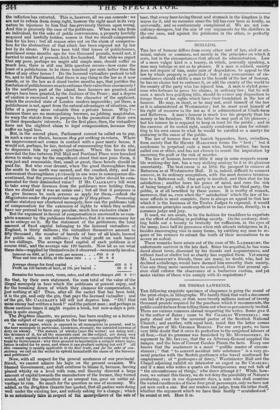DUELLING.
THE law of honour differs from every other sort of law, civil or cri- minal, statute or common, not merely in the principles on which it rests, but in the circumstances that attend its administration. Law of a more vulgar kind is a luxury, in which, generally speaking, a man may indulge or not as he pleases. If a man is robbed, society does not require of him, under pain of degradation, to appeal to the law by which property is protected ; but if any concurrence of cir- cumstances should entitle a man to the benefit of the law of honour, he has no choice but to embrace it, or add the enmity of the world to the enmity of the party who has injured him. A man is styled gene- rous who forbears to press his claims, in ordinary law ; but he will earn a much less gratifying title, should he evince any disposition to forego those of his rights which have their foundation in the law of honour. He may, in short, or he may not, avail himself' of the law as it is administered at Westminster ; but he must avail himself of his right of recourse to the law as it is administered at Chalk-farm and Battersea. A man's honour is much less his property than his money or his furniture. With the latter he may part at his pleasure ; but his honour he is required to keep in trust for the public ; and in the exercise of its vested right, society condemns a man for submit- ting in his own cause to what he would be extolled as a martyr for enduring in the cause of the public. The law of honour does not banish hypocrites, liars, swindlers, from society that Sir HENRY HARDINGE terms the " best ; " but it condemns to perpetual exile a man who, being neither, has been called one or other, and has not chosen to resent' the imputation by incurring the guilt or the risk of murder. The law of honour, however little it may in some respects resent ble working-day law, has a very striking analogy to it in its glorious uncertainty. The best cause is as little the passport to success at Battersea as at Westminster Hall. It is, indeed, difficult to connect success, in its ordinary acceptation, with the most decisive termina- tion to a Battersea suit. One party is insulted, and then shot for his satisfaction ; another loses his peace of mind, and runs the risk of being hanged ; while it is not easy to see how the third party, the i public, s at all benefited by these issues. It is worthy of remark, moreover, that as, even when the" satisfaction" which the law of ho- nour affords is most complete, there is always an appeal to that law which it is the business of the Twelve Judges to expound, it would on common principles seem expedient to have recourse, directly, to a common judge and jury. It used, we are aware, to be the fashion for twaddlers to expatiate on the effect of duelling in polishing society. On the contrary, duel- ling holds out a bounty to brutality for ruffianism, in the eyes of the many, loses half its grossness when risk attends indulgence in it ; besides encouraging vice in many forms, by entitling any man to re- quire of his censors to submit the truth of their accusations to so severe an ordeal.
These remarks have arisen out of the case of Mr. LAMBRECHT, the unfortunate survivor in the late duel. Since his acquittal, he has wan- dered about town, disowned by his friends and acquaintances, and without food or shelter but as charity has supplied them. Yet among Mr. LAMBRECHT'S friends, there are many, no doubt, who, had he declined a challenge, would have deemed him unworthy their society. Can any thing more monstrous be conceived, than that general opi- nion shall enforce the observance of a barbarous custom, and yet make victims of those who comply with its requisitions ?


















 Previous page
Previous page